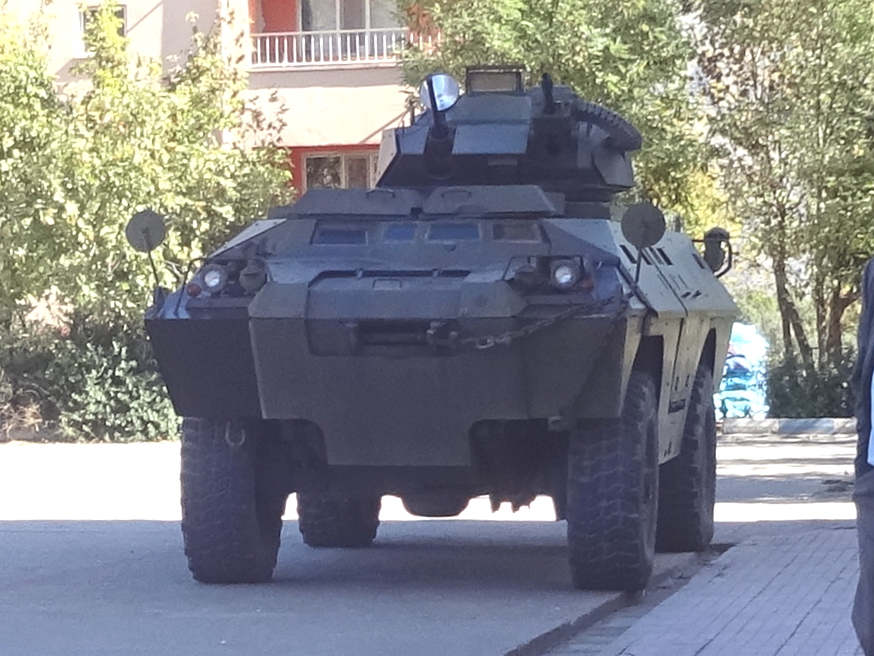
The Turkish elections of November the 1st were held under extraordinary circumstances. In June the AKP, the party that has ruled Turkey since 2002, lost its absolute majority and was thus unable to embark on its programme to concentrate power in the hands of an executive AKP presidency. Not only did the AKP lose much of its power in the June 2015 elections, but they lost power to the pro-Kurdish, leftist HDP. The HDP won a surprise 13%, passing the 10% threshold needed to gain representation in the Turkish parliament. This was a historic moment for not only the HDP but also the wider Kurdish movement; the HDP is central to Kurdish aspirations in Turkey and has long been accused of having links to the banned PKK. The run-up to the election saw a repression and intimidation by the Turkish state to hobble the opposition HDP.
Erdoğan is accused of restarting military operations against the PKK in order to bolster his image as a strong leader. By embarking on a campaign of bombing and repression against the PKK and besieging Kurdish cities, Erdoğan and his party appeal to ethnic Turkish nationalist sentiment and steal votes from the far-right Nationalist Action Party (MHP).
Opposition media was systematically targeted by the Turkish state in the run-up to the election. The Ipek media group was raided and its broadcasting and print operations were shut down just days before the election. Jinha, a Diyarbakır based Kurdish women’s news agency was blocked online, and several international journalists have been barred from the country.
But by far the most pivotal event in the run-up to the election was the October 10th bombing of the HDP rally in Ankara. 102 people, mostly HDP supporters, were killed in a twin suicide bombing attributed to the Islamic State. After the rally the HDP cancelled further rallies, giving the ruling AKP a huge advantage in the run-up to the election. The Turkish ‘deep state’ has a long history of collusion with violent non state groups to further its ends, and many, Kurds and non-Kurds alike, suspect that the Turkish state facilitated the bombings to further the AKP’s electoral chances.
The AKP’s landslide victory has cemented president Erdoğan’s grip on power in Turkey. With little to hold back the AKP’s political programme, the future looks grim. It is likely that Turkey will be sucked further and further into an unwinnable war against the PKK, whose affiliate, the PYD, are the USA’s only reliable ally in their war against the Islamic State in Syria. In June this year Erdoğan stated, “We will never allow the establishment of a state on our southern border in the north of Syria”, a virtual declaration of war against Rojava and a boon to the Islamic State. An increasingly isolated Turkey that appeals more and more to nationalist and Islamist sentiments would no doubt increase the chances of further mass killings by supporters of the Islamic State. There is a real danger that a newly emboldened Turkish state will seek military solutions to political problems and thus find itself inexorably sucked into the same spiral of sectarian violence that has all but destroyed neighbouring Syria and Iraq.
Not long ago Turkey’s leaders described their foreign policy as ‘zero problems with neighbours’, and counted Ba’athist Syria, Iran and Russia as close allies. By trying to take advantage of the chaos of the Arab Spring to install puppet governments in the middle east, it has gone from “zero problems” to ‘zero friends’. A series of avoidable decisions seem to have set the Turkish state on a path of permanent war. If this trajectory is not changed there is a danger that Turkey itself may become the region’s next “failed state” and a victim of it’s own hubris in believing it could remake the middle east in its own image.
[…] After the Turkish elections 9 November 2015 / Kurdish Solidarity Network The Turkish elections of November the 1st were held under extraordinary circumstances. In June the AKP, the party that has ruled Turkey since 2002, lost its absolute majority and was thus unable to embark on its programme to concentrate power in the hands of an executive AKP presidency. Not only did the AKP lose much of its power in the June 2015 elections, but they lost power to the pro-Kurdish, leftist HDP. The HDP won a surprise 13%, passing the 10% threshold needed to gain representation in the Turkish parliament. […]